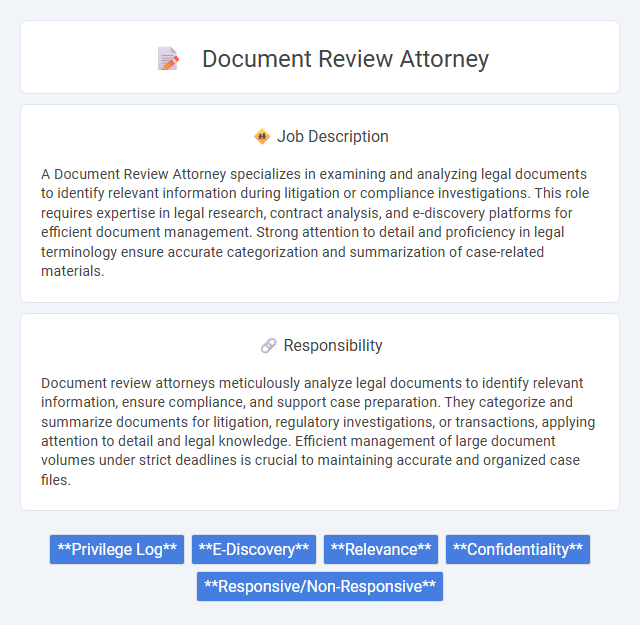
A Document Review Attorney specializes in examining and analyzing legal documents to identify relevant information during litigation or compliance investigations. This role requires expertise in legal research, contract analysis, and e-discovery platforms for efficient document management. Strong attention to detail and proficiency in legal terminology ensure accurate categorization and summarization of case-related materials.
Individuals who possess strong attention to detail and an aptitude for analyzing large volumes of text might be well-suited for a document review attorney job. Those who thrive in structured environments and can maintain focus for extended periods may find this role compatible with their skills and work habits. Candidates with limited tolerance for repetitive tasks or high-pressure deadlines could potentially find the job less suitable for their temperament.
Qualification
A Document Review Attorney must possess a Juris Doctor (JD) degree and be licensed to practice law in at least one jurisdiction. Strong analytical skills, attention to detail, and proficiency with e-discovery tools such as Relativity or Concordance are essential for accurately reviewing and categorizing legal documents. Experience in litigation, contract law, or regulatory compliance enhances the ability to identify relevant information and ensure adherence to legal standards.
Responsibility
Document review attorneys meticulously analyze legal documents to identify relevant information, ensure compliance, and support case preparation. They categorize and summarize documents for litigation, regulatory investigations, or transactions, applying attention to detail and legal knowledge. Efficient management of large document volumes under strict deadlines is crucial to maintaining accurate and organized case files.
Benefit
Document review attorney jobs likely offer significant benefits such as flexible work hours and remote work options, which can enhance work-life balance. This role may provide exposure to diverse legal cases, contributing to skill development and professional growth. Competitive compensation and the potential for contract extensions or permanent positions may also be probable advantages.
Challenge
The role of a document review attorney likely involves navigating complex legal materials under tight deadlines, which can pose significant cognitive and time-management challenges. Attorneys may frequently encounter ambiguous or voluminous data requiring meticulous analysis to ensure accuracy and compliance. The probability of encountering high-pressure situations is considerable, especially in large-scale litigation or regulatory investigations demanding thorough yet efficient review.
Career Advancement
Document review attorney roles provide foundational legal experience critical for career advancement within law firms and corporate legal departments. Mastery of contract analysis, compliance assessment, and electronic discovery enhances professional qualifications for higher-level positions such as associate counsel or litigation specialist. Consistent performance and expertise in managing large volumes of legal documents streamline promotion opportunities and increase visibility among senior legal leadership.
Key Terms
Privilege Log
Document review attorneys play a crucial role in managing privilege logs, which are essential for identifying and categorizing documents that are protected from disclosure in legal cases. Expertise in accurately creating and maintaining privilege logs ensures compliance with court rules and protects client confidentiality during the discovery process. Mastery of this task improves efficiency in large-scale reviews and supports litigation strategies by clearly documenting privileged communications and materials.
E-Discovery
Document review attorneys specializing in e-discovery conduct thorough analysis of electronically stored information (ESI) to identify relevant documents for litigation or regulatory compliance. They utilize advanced e-discovery software tools to efficiently manage large volumes of data, ensuring the accuracy and confidentiality of sensitive information. Expertise in legal protocols and data privacy regulations is essential for navigating complex e-discovery processes and supporting case strategy development.
Relevance
A Document Review Attorney specializes in analyzing and categorizing legal documents in response to discovery requests during litigation. Precision in identifying relevant, privileged, or confidential information directly impacts case strategy and compliance with legal standards. Expertise in e-discovery tools and familiarity with legal terminology enhance the efficiency and accuracy of document relevance assessments.
Confidentiality
Document review attorneys handle sensitive legal and corporate information, making strict confidentiality protocols essential to protect client privacy and uphold professional ethics. They must ensure that all reviewed documents are securely managed and accessed only by authorized personnel to prevent data breaches and maintain trust. Commitment to confidentiality safeguards the integrity of legal proceedings and supports compliance with regulatory requirements.
Responsive/Non-Responsive
A document review attorney specializes in identifying responsive and non-responsive documents during the e-discovery process, ensuring relevant materials are accurately classified for litigation or investigation. Expertise in analyzing large volumes of electronic records and applying precise criteria to determine responsiveness is critical to maintaining case integrity and compliance. Their role significantly influences case outcomes by efficiently filtering essential information from irrelevant data.
 kuljobs.com
kuljobs.com